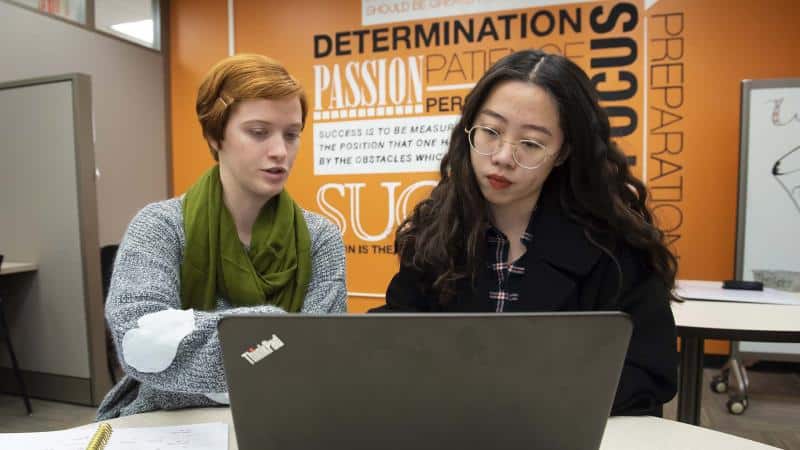Auburn University Montgomery awarded $2.16 million grant to enhance student success and student experiential learning
Auburn University Montgomery awarded $2.16 million grant to enhance student success and student experiential learning
The student experience at Auburn University at Montgomery (AUM) is getting a boost thanks to a $2.16 million grant to enhance student success through experiential learning opportunities and faculty development.
The “Enhancing Persistence through Early Engagement, Experiential Learning and Campus Connection” project is supported by a five-year, Title III Strengthening Institutions grant from the U.S. Department of Education awarded to AUM in October.
“This project aligns with key components of our 2019-2024 Strategic Plan,” Auburn University at Montgomery Chancellor Carl A. Stockton said. “We have outlined ambitious but attainable objectives, including increasing enrollment to 7,000 students by the end of 2024. To achieve this, we are focused on improving student retention and graduation rates by testing and implementing new approaches to student engagement and support.”
AUM Provost and Senior Vice Chancellor Mrinal Varma said the grant represents the “next step in AUM’s history of developing a support system to foster student success.” Varma serves as principal investigator on the grant, while Associate Provost for Undergraduate Studies Joy Clark and Associate Vice Provost for Enrollment Management and Student Affairs Sameer Pande are co-principal investigators.

AUM student Victora Kenyon tutors student Yuqing Tong in The Learning Center.
The grant provides funding for AUM to create new innovative co-curricular programs – learning experiences that complement what happens inside the classroom – to elevate the student experience in the areas of experiential learning and community engagement, Varma said. The grant also will be used to create new opportunities for peer mentoring, faculty development, and to support the supplemental instruction of students in gateway courses at AUM.
“We want to strengthen student connections to campus and their academic career through these initiatives,” he said. “Overall the grant will help our students succeed at a higher rate.”
The first step in implementing the grant project is already underway with the training of student peer mentors to assist students experiencing difficulties in gateway courses, which are for college credit and count as a requirement to a particular degree. Under a new model, student peer mentors at AUM will be placed in classrooms to assist students.
“This is going to require some training for students who serve as peer mentors,” Clark said. “We are working to identify who those students are needing help and plan to work with faculty about their expectations because this will be a new model for them as well.”
Additionally, the grant project calls for AUM to create a center – the Experiential Education and Engagement Center (EEEC) — to support peer mentoring activities, as well as student community engagement initiatives and faculty development opportunities.
The new center will be managed under AUM’s University Honors Program and require the university to create new positions for a program coordinator, faculty learning specialist/research coordinator and a data analyst/assessment specialist. The three positions will be funded by the Title III grant for the first five years.
“What this grant has done is give us the added resources where we can actually enhance some of the things that we were already doing and also institutionalize some of the efforts we’ve been doing on a trial basis such as the peer mentoring,” Pande said. “We now have the funding to actually put forth a comprehensive plan and hire the support staff we need rather than trying to do some things in a piecemeal approach.”
Clark said personnel within the center will require professional development to help the university embed student and faculty peer mentors inside AUM colleges to serve as “kind of champions” for helping students succeed in their courses. AUM recently earned national recognition for innovative approaches to program.
In addition to being ranked 33rd among public regional universities in the South by U.S. News & World Report, AUM earned a No. 88 national ranking in the category of “First-Year Experiences,” which assesses seminars and similar programs that regularly bring small groups of students together with faculty or staff in support of student success.
Although AUM has a Faculty Development Institute, the university is venturing into new territory with the center. For the first time, a dedicated coordinating body will oversee and track student success, community engagement, and faculty development initiatives at AUM, Clark said.
“This center is an opportunity to start recognizing what we currently are doing in these areas and creating more opportunities,” she said. “One of things we envision this center doing with its personnel is building relationships between programs and the community, and also working on faculty development.”
AUM’s goal is to make the center a leading destination for community engagement in Montgomery, Varma said. The center also will help AUM achieve Carnegie Classification for Community Engagement, an elective designation for institutions that demonstrate they have policies and practices in place to help students learn about service learning, community service and establishing community partnerships, he said.
“With the establishment of the center, AUM can begin to address issues related to social justice, income inequality, and this is very important because we want our students to be leaders in these areas,” Varma said. “We have AUM students who are so deserving of this type of support and now we can provide it to them with cutting-edge programs and services.”
